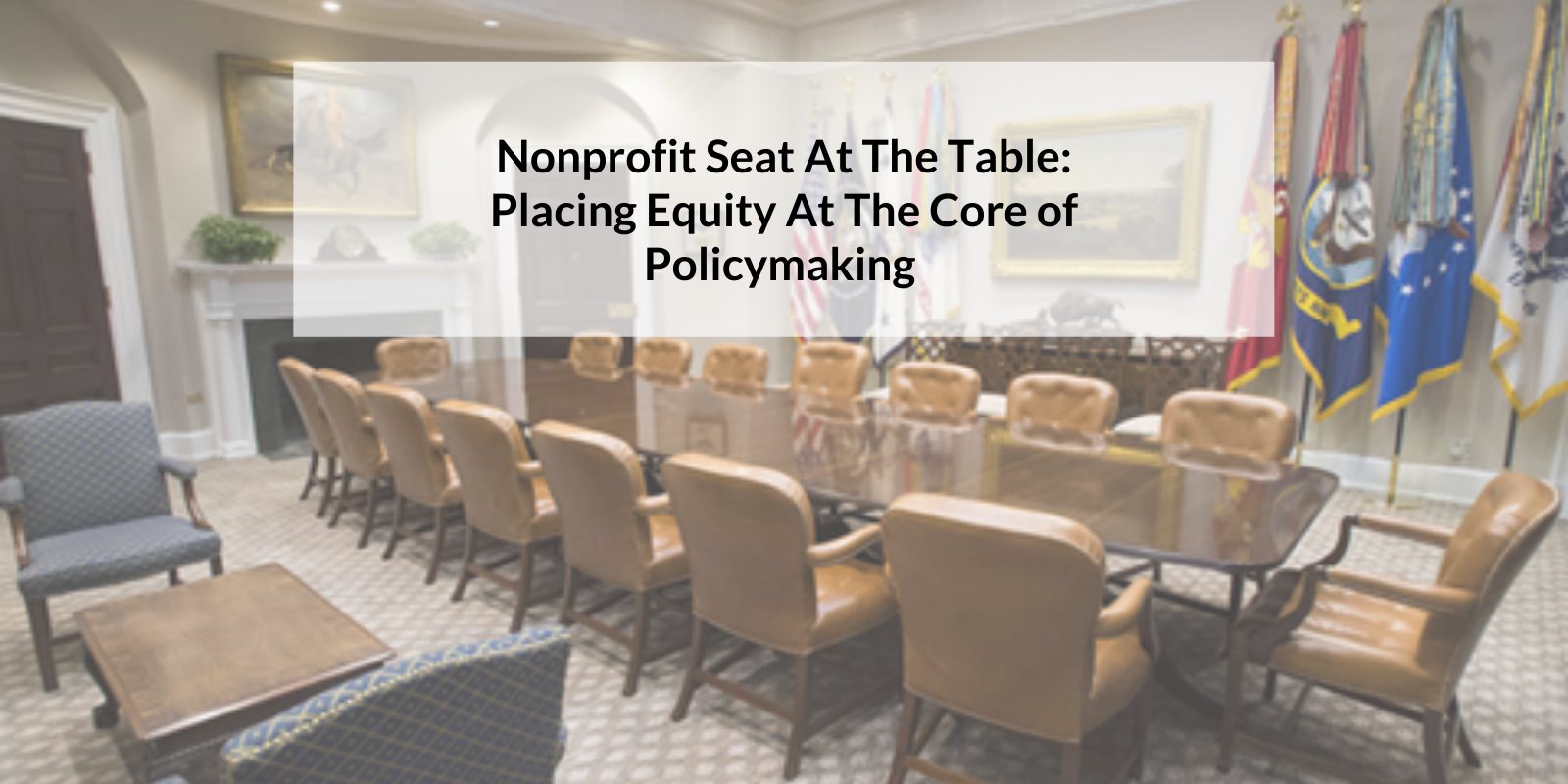By: Nancy Barry, Manager, Special Initiatives and Neisha McGee, Manager of Advocacy, Engagement, and Mobilization, Independent Sector
Since its inception, the nonprofit sector has served as the bridge between government and community – a role that has ultimately defined America. Yet, despite our scale and unique understanding of community needs, nonprofits are often on the “outside looking in” when federal-level policies are decided. The Seat at the Table initiative aims to move nonprofits beyond the role of merely bridging to implement a strategy of setting the agenda and informing public policy.
To fulfill our missions, nonprofits must be strong, agile, and equipped with sufficient resources. But obtaining access to requisite resources, much of which derive from public sources, requires that nonprofits, like our counterparts in the private sector, are fully and permanently represented at the highest level of government. However, public engagement doesn’t begin and end at representation. An equitable policy process ensures those most impacted by a proposed policy are consulted throughout the policy development process, from conceptualization to implementation.
Strengthening the relationship between the nonprofit sector and the federal government requires a multipronged strategy that illustrates nonprofit expertise and profound impact. One element of the strategy establishes The White House Office structure by way of an Executive Order prepared for the President’s signature. The second element proposes legislation that serves as a companion measure to ensure the implementation of this newly developed apparatus exceeds the tenure of any single Administration. The final and most important element involves a robust and well-coordinated advocacy campaign comprised of nonprofit leaders who are prepared and willing to educate policymakers and their networks about the legislation and the long-term benefits that it will produce.
Building the capacity to advance community solutions that yield equitable outcomes requires reforms that cut through the red tape to assess and remedy barriers, burdens, and inequities in public service delivery. The Nonprofit Sector Strength and Partnership Act of 2022 is the first step in establishing mechanisms to help nonprofits shape and improve federal policy while expanding opportunities to achieve shared goals. While this legislation includes a wide range of structures and policies to give the nonprofit sector a seat at the proverbial table, here are some highlights with a particular focus on those that advance equity:
White House Office on Nonprofit Sector Partnership
- The Executive Office established by the legislation will develop a commission on Federal grant reform to offer recommendations to improve the operational relationship between all levels of government and the nonprofit sector. To ensure equitable representation across the breadth of the nonprofit sector, the Commission will comprise organizations of all sizes as determined by annual revenue to include meaningful racial, gender, ethnic, and geographic diversity.
- The Executive Office initiates a federal grant process to establish an online portal, such that charities could register for fundraising opportunities across multiple states at one time. The development of this multistate portal is a critical means of helping reduce administrative costs for all charities, especially for smaller organizations that may be led by people of color.
- The Executive Office will also work with federal agencies to coordinate an annual release of disaggregated data about nonprofits to improve federal grants, financial assistance, and contracting processes for nonprofits.
Interagency Council on Nonprofit Sector Partnership
- This provision establishes an interagency council, comprised of representatives from every cabinet agency, as well as the Corporation for National and Community Service, National Endowment for the Humanities, National Endowment for the Arts, National Science Foundation, and Institute of Museum and Library Services.
- This legislation also directs the Interagency Council to meet four times a year and release a biennial report providing policy recommendations about how the nonprofit sector can best leverage federal investments, as well as how to strengthen the sector’s ability to address issues of national significance.
- Recommendations proposed by the Council will include methods to improve Federal research, data access, and transparency, including the collection and analysis of disaggregated data relevant to the sector’s ability to respond to societal needs.
Advisory Board on the Nonprofit Sector
- The legislation establishes an Advisory Board on the Nonprofit Sector, comprised of eight presidential appointees (including the Nonprofit Advisor) and eight congressional appointees, with two of each appointed by the Speaker of the House, the House Minority Leader, the Senate Majority Leader. The board is co-chaired by the Nonprofit Advisor and one other member, who may not be from the same political party.
- Board members shall be drawn from the sector and reflect a diversity of organizational type and size to include meaningful racial, gender, ethnic, and geographic diversity. While many members of federal advisory boards are only reimbursed for travel expenses, the legislation would make the ability to serve on this Advisory Board more equitable by also compensating members for their time.
- Although the Advisory Board has many duties, one of its primary responsibilities is to release a biennial report of policy recommendations concerning the nonprofit sector. Importantly, the Board’s report must consider the impact of any recommendation on racial and ethnic disparities.
Collaborative Governance & Equitable Data
- The legislation directs the Treasury Department to make recommendations enhancing the way grant, contract, and reimbursement funds are recorded on nonprofits’ annual information returns. Additionally, it calls on the Treasury Department to rescind and replace the Form 1023-EZ application for tax exemption, and to propose policies to improve appropriate oversight of the nonprofit sector.
- Furthermore, this provision directs the Bureau of Labor Statistics to release quarterly economic data about nonprofit organizations, as it does for for-profit organizations. The measure also directs the Office of Management and Budget (OMB) to work with agencies to gather disaggregated data on the nonprofit sector according to race, gender, age, income level, language, and geographic location.
- The legislation also requires the OMB to conduct an impact assessment of how government data collection, algorithm use, and accuracy may have a discriminatory or disparate impact on nonprofit issues and marginalized communities served by nonprofits.
Support the Nonprofit Sector Strength and Partnership Act
It is past time for a better system that prioritizes the needs and expertise of nonprofits and their communities, rather than treating our sector as an afterthought. Empower nonprofit workers and our communities by signing a letter of support that will be shared with Congress at the time of introduction. Now is the time for nonprofits to become informed and engaged! Use our advocacy tools and resources to urge the organizations and stakeholders in your network to support the Nonprofit Sector Strength and Partnership Act.
About Independent Sector:
Independent Sector is the only national membership organization that brings together a diverse community of changemakers at nonprofits, foundations, and corporate giving programs working to strengthen civil society and ensure all people in the United States thrive. As the vital meeting ground, we advance our mission by fostering a sense of belonging, catalyzing action, and providing policy leadership across the full breadth of the charitable sector.



